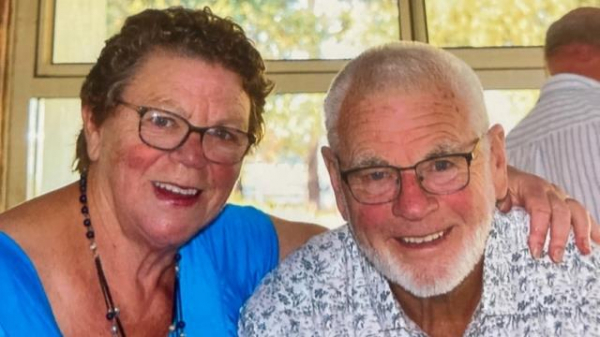Navigating the Looming Wave: Preparing for the Surge in Demand for Palliative Care Services in Australia's Aging Population
Jan Kasteel and her beloved husband Frank shared a bond that endured over five decades of marriage. However, in 2017, their journey took an unexpected turn when Mr. Kasteel was diagnosed with a language variant of Alzheimer's disease. Jan vividly recalls the challenges they faced as the disease progressed, gradually eroding their ability to communicate. "As the disease progressed there would be a step down … and those steps got bigger," she recounted. "And the last couple of years … I could only understand about 10 per cent of what he was saying. It became quite lonely. We were partners all our lives.
In the twilight of Frank's life, Jan reached out to the palliative care team at Royal Hobart Hospital for guidance on providing the best possible support for her ailing husband. Reflecting on her experience, she expressed regret for not seeking assistance earlier. "I would have been able to have someone to talk through what was happening for me, instead of being involved so much in the moment of caring," she lamented.
As Australia stands on the cusp of a significant demographic shift, Jan Kasteel's story foreshadows a reality that will become increasingly common. Within six years, the first wave of Australia's baby boomers will reach the age of 85, marking the beginning of a dramatic increase in the elderly population. By the end of this decade, the number of Australians aged 85 and above is projected to grow by 60,000 annually, a sharp rise from the 20,000 recorded in 2024.
Demographer Bernard Salt draws a striking analogy, likening the impending surge in demand for aged and palliative care services to an unstoppable freight train hurtling towards the nation. He underscores Tasmania's predicament, where the accelerating aging trend necessitates urgent planning and support measures. "This is accelerating, it's gathering pace. It's like a freight train heading downhill towards us," Salt warned.
A sobering 2020 report by KPMG forecasts a staggering 200% increase in national demand for palliative care services by 2050, reaching 188,264 individuals. Despite the daunting statistics, Salt remains optimistic that proactive measures can avert a potential crisis. "This is part of the Australian lifestyle, part of the Australian story," he affirmed. "Let's make it as good a story as we can over the next decade.
The latest State of Palliative Care report by Palliative Care Tasmania underscores the pressing need for enhanced coordination and planning to support individuals with life-limiting illnesses. Alarmingly, the report reveals that three-quarters of Tasmanians in their final year of life could have benefited from palliative care interventions such as pain management, counseling, and family support.
As Australia grapples with the imminent demographic shift, it is imperative to heed the lessons from Jan Kasteel's poignant journey and proactively prepare to meet the escalating demand for palliative care services.
Unpaid Carers: The Backbone of Palliative Care, Highlighting Systemic Challenges in Tasmania
Recent observations suggest that the burgeoning demand for palliative care services in Tasmania is primarily being shouldered by unpaid carers, echoing nationwide trends identified in a 2014 Grattan Institute study. According to the report, there exists one unpaid carer for every Tasmanian in need of palliative care, with family members contributing 75-90% of the care required by individuals with palliative needs. Particularly in regional Tasmania, where demand often outstrips available resources, unpaid carers are filling in the gaps left by disparities in the distribution of paid workers across the state.
Venéy Hiller, CEO of Palliative Care Tasmania, laments the fragmented nature of the current system, which places substantial burdens on families facing end-of-life situations. "The way that we look after our sick and dying, and our bereaved, is a reflection of who we are as a society," Ms. Hiller asserts. "It's evident that discussing end-of-life care and palliative care remains a challenge, both within our homes and communities, as well as at the governmental level.
For Judi Adams, aged 57, the urgency for change is palpable. Diagnosed unexpectedly with pancreatic cancer after experiencing a sudden loss of appetite, Ms. Adams emphasizes the need for a paradigm shift in how society perceives and engages with palliative care. "It was quite a shock," she reflects. "It forced me to reassess my priorities and what truly matters in life.
Ms. Adams advocates for a broader understanding of palliative care beyond its association solely with end-of-life care. "Palliative care isn't just about the final stages of life; it's about providing supportive care throughout the journey of a life-limiting illness," she explains. Returning to Hobart to be surrounded by loved ones, she is proactively planning her care through an advance care plan as her health declines. "Even as you lose control over certain aspects of life, having a say in your care provides a sense of comfort and dignity," she asserts. "Addressing the needs of the soul and the heart is just as crucial as addressing physical symptoms.
As Tasmania grapples with the evolving landscape of palliative care, the invaluable contributions of unpaid carers underscore the pressing need for systemic reform to ensure equitable access to comprehensive end-of-life support for all Tasmanians.
In conclusion, the narratives of Jan Kasteel, Venéy Hiller, and Judi Adams shed light on the intricate challenges and profound realities surrounding palliative care in Tasmania. Their stories underscore the indispensable role of unpaid carers in meeting the escalating demand for end-of-life support, while also revealing the systemic deficiencies and fragmentation within the current care system. As Tasmania and indeed the nation confront the imminent wave of aging demographics, it is imperative to heed these voices and implement proactive measures to ensure equitable access to palliative care services for all. By fostering open dialogue, enhancing support structures, and embracing a holistic approach to care, we can strive towards a future where every individual facing life-limiting illnesses receives the dignity, compassion, and support they deserve on their journey towards the end of life.

